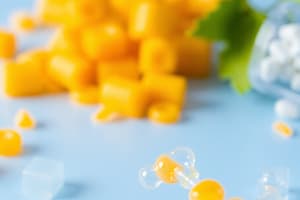Podcast
Questions and Answers
What is the most common monosaccharide?
What is the most common monosaccharide?
- Fructose
- Glucose (correct)
- Galactose
- Maltose
What is the difference between starch and cellulose?
What is the difference between starch and cellulose?
- Starch is largely helical and cellulose molecules are straight and unbranched (correct)
- Starch is a polymer of fructose and cellulose is a polymer of glucose
- Starch is straight and unbranched and cellulose is largely helical
- Starch is a polymer of glucose and cellulose is a polymer of fructose
What is a disaccharide?
What is a disaccharide?
- A reaction that is essentially the reverse of the dehydration reaction
- A monomer composed of a single sugar
- A covalent bond between two monosaccharides (correct)
- A polymer composed of many sugar building blocks
Which polysaccharide is a major component of the tough wall of plant cells?
Which polysaccharide is a major component of the tough wall of plant cells?
What is lactose intolerance?
What is lactose intolerance?
Flashcards are hidden until you start studying
Study Notes
Monosaccharides
- Glucose is the most common monosaccharide.
Polysaccharides
- Starch and cellulose are both polysaccharides, but they differ in their glycosidic bonds: starch has α-1,4 bonds, while cellulose has β-1,4 bonds.
- Cellulose is a major component of the tough wall of plant cells.
Disaccharides
- A disaccharide is a type of sugar formed by the bonding of two monosaccharides.
Lactose Intolerance
- Lactose intolerance is a condition in which the body is unable to digest lactose, a disaccharide found in milk, due to a lack of lactase enzyme.
Studying That Suits You
Use AI to generate personalized quizzes and flashcards to suit your learning preferences.




